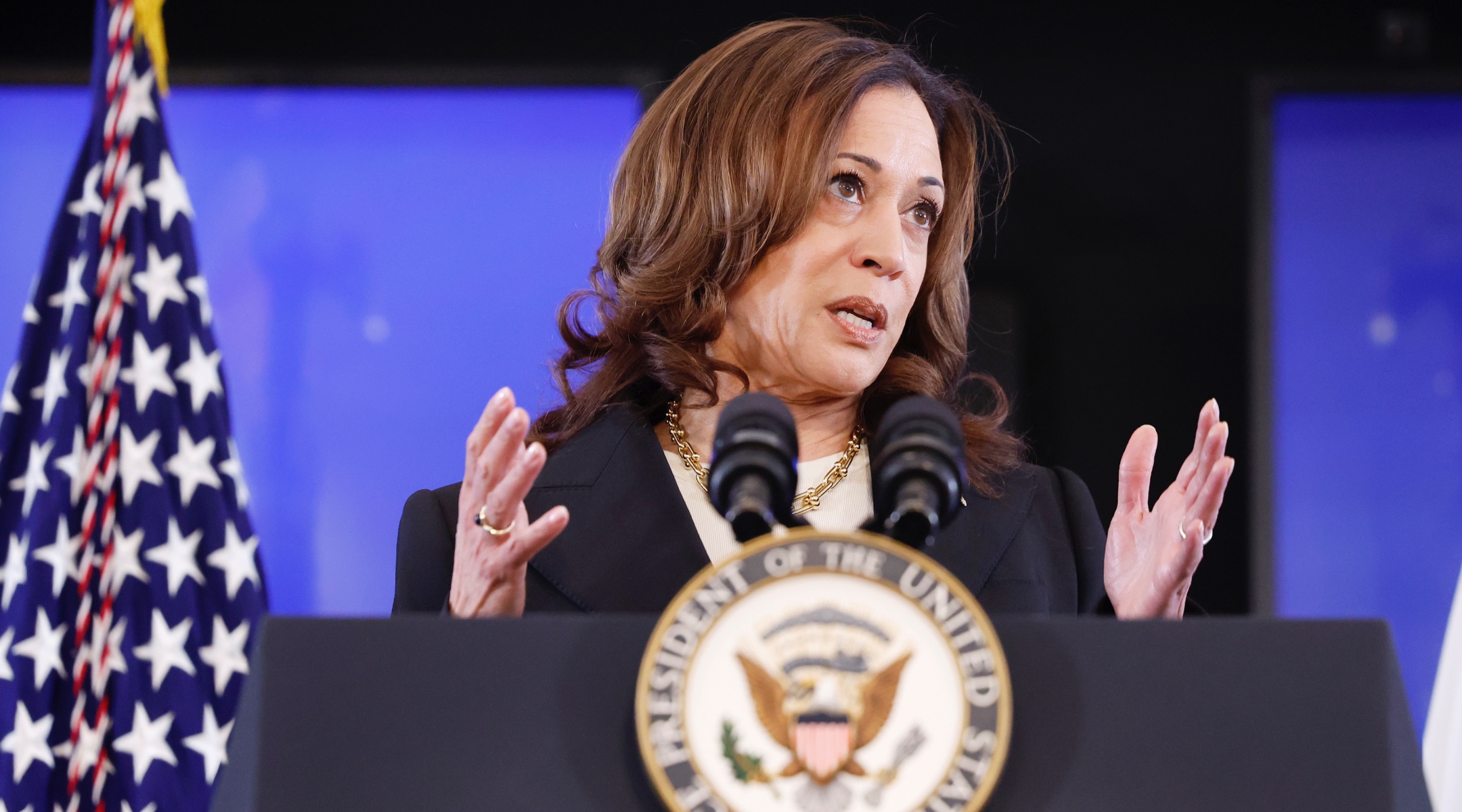‘We cannot look away,’ Kamala Harris says after White House screening of Sheryl Sandberg documentary on Oct. 7 sexual violence
The White House convened a screening in part to refute the denial of sexual atrocities on Oct. 7

U.S. Vice President Kamala Harris gives remarks on conflict-related sexual violence at an event in the Eisenhower Executive Office Building, adjacent to the White House, June 17, 2024. (Anna Moneymaker/Getty Images)
(JTA) — WASHINGTON — Vice President Kamala Harris screened “Screams Before Silence” at the White House on Monday, in part to refute denialism of Hamas’ sexual violence as exposed in the documentary produced by Sheryl Sandberg.
“We cannot look away and we will not be silent,” Harris said ahead of the screening, to a room packed with representatives of women’s and human rights groups. “My heart breaks for all these survivors and their families and for all the pain and suffering from the past eight months in Israel and in Gaza.”
Sandberg, the former chief operating officer of social media giant Meta, produced the film to counter denialism of sexual violence that took place on Oct. 7, when Hamas terrorists massacred more than 1,200 people in Israel, and the sexual assault endured by some of the hostages Hamas terrorists abducted that day.
“Some pretty mainstream people are either ignoring or worse denying this happened,” Sandberg told the Jewish Telegraphic Agency after the screening. “So this aspect I think, gets to the heart of what people need to believe to understand what happened and what this kind of terror really is.”
Sandberg’s public condemnation of rape as an act of war in November and the subsequent documentary represent some of the most potent efforts in a broad campaign to call attention to the use of sexual violence on and after Oct. 7, which is a war crime. Jewish advocates pressed the United Nations for months to acknowledge and condemn Hamas’ use of sexual violence before the body did so in March. A number of international women’s organizations were also slow to recognize the sexual violence of Oct. 7, said Sheila Katz, the National Council of Jewish Women CEO who was present at the screening and counting the non-Jewish organizations in the room.
“Sheryl now has given us a platform to show interviews of what took place to make sure that more people can call this out and more people can engage with it,” Katz said in an interview.
Amit Soussana, a former hostage and one of the sexual assault survivors who is extensively interviewed in the film, appeared at the event.
“Being in captivity means having no control over your mind, body or soul,” she said. “You have absolutely no control over what happens to you. All your basic human rights are taken from you. Even your feelings are completely controlled by someone else.”
Soussana revealed after her release that one of her Hamas captors had assaulted her. “The sexual assault I experienced should never happen to any human being under any circumstances. No one should ever be sexually violated, and there are no justifying circumstances for these crimes,” she said.
Soussana seemed to want to reassure the audience she was in recovery. “I don’t see myself as a victim, I am a strong, independent woman, and no one can change that,” she said, adding, “It will always be a part of my story, but in time the trauma will subside.”
Harris and Sandberg both called for an end to the war and the release of the hostages, of whom as many as 80 are thought to remain alive. “President Biden and I have made clear Hamas needs to accept the deal that is on the table for a ceasefire which would bring the hostages home and lead up to a permanent end to hostilities,” said Harris, who said she feared that more accounts of sexual violence would emerge as more hostages are freed.
President Joe Biden has blamed Hamas for the current impasse for the U.S.-proposed deal, which would start with a temporary ceasefire and an exchange of hostages for Palestinian prisoners, and then would possibly end the war. The Netanyahu government has not made clear whether it accepts the terms.
Harris framed the event as part of an initiative she is spearheading on raising awareness about conflict-related sexual violence. A panel of speakers on experts on sexual violence spoke that included Nadia Murad, the Nobel Peace Prize laureate who is a survivor of the Islamic State’s genocide of the Yazidi people.















